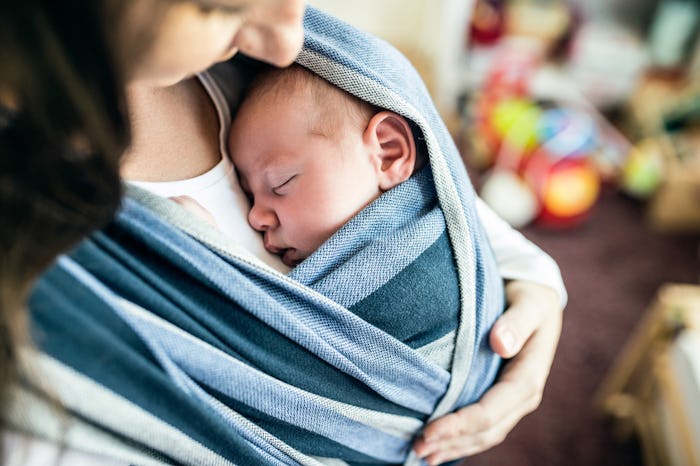Life

Here's How Babywearing *Really* Affects Your Baby Later In Life, According To Experts
New moms love the time spent bonding with their babies, but sometimes, a mama’s just got to get some chores done around the house. Babywearing is a popular way to keep baby calm, and mom hands-free. How babywearing affects your baby later is something to consider when deciding if it’s right for you, but one pediatrician says the outcomes should all be positive.
Babywearing International describes babywearing as using a baby carrier of any style — a sling, pouch, harness, or other — to keep your baby close to your body while doing your daily activities. Their website cites studies which have found that babywearing promotes mom and baby bonding, can help ease postpartum depression, and even keep babies from crying as often.
Randy Thornton, M.D., pediatrician at Jacksonville Pediatrics and Wolfson Children’s Hospital of Jacksonville, tells Romper in an interview that mothers and babies should be having lots of physical contact. This is especially important during baby’s first months of life, when babywearing can kickstart long-term psychological benefits.
“Bonding with the baby early on, whether it be with a baby wearer or pouch, can help you be hands-free to work around the house. For the first six months, it has huge benefits for bonding,” Thornton says. “For the first six months of life, babies are in the stage of trust. You’ll hear grandparents say, ‘Don’t spoil that baby!’ but we’ve found out that either through babywearing or holding the baby, you’re doing everything to help that child develop as a baby who’s more socially adjusted and quiet.”
WeTheParents.org referenced a study which found that more physical contact between mother and baby, like when babywearing, helps your baby develop a secure attachment to you. Having a secure attachment means that your little one feels loved, supported, and safe, according to UC Berkeley’s website. Having this relationship helps them become confident and independent as they age, the site noted. Whether a baby has a secure attachment to his or her parents becomes apparent as they grow up.
“After six months, usually they’re in that separation and stranger anxiety phase anyway, so comforting your baby or toddler is great. The evidence is overwhelming that keeping them close by can be helpful. I always sing the praises of parents who, when the kid starts screaming when I walk into the exam room, their child leaps into their arms. They’re bonded,” Thornton says.
Thornton says there isn’t much scientific research about how babywearing affects babies physically over time. CHOA.org stated that most modern-day baby carriers support babies’ ideal posture, with their legs spread apart and their spines in a C shape. Just keep in mind that while babywearing has proven benefits, as your little one gets bigger, they need time to do other things.
“There’s no evidence of physical issues for the baby. The only thing I would worry about is if it’s all day long for walking development, but I don’t think there’s a lot of evidence about babywearing delaying walking,” he explains. “As long as the baby can’t sink down for anything to block their nose or airways, they should be fine. If their carrier is too tight, they may get abrasions and rashes, but parents can just change the position.”
So, with the knowledge that babywearing has positive long-term effects on your child’s mental health and no negative ones on their bodies, babywear to your heart’s content. Thornton agrees, and says to ignore anyone who doesn’t approve. “Never feel bad about ‘spoiling’ the baby. Holding them too close is impossible.”
Experts:
Randy Thornton, M.D., pediatrician at Jacksonville Pediatrics and Wolfson Children’s Hospital of Jacksonville
This article was originally published on